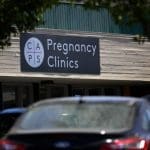Arkansas wants to use COVID-19 to stop people from accessing abortion
GOP-dominated states are continuing to use the coronavirus crisis to ban abortion even as they allow access to other health care.

Even as parts of the country start to reopen and resume business activities, including medical services, access to abortion services is not necessarily returning in those states that cited the pandemic to ban it.
In March and April, eight states — Alabama, Arkansas, Iowa, Louisiana, Ohio, Tennessee, Texas, and West Virginia — issued executive orders severely restricting or banning abortion by calling it a “non-essential” or “elective” surgery. In turn, this forced a series of court battles about whether the procedure should remain available during the pandemic.
After an appeals court upheld Arkansas’ attempt to ban most abortions under a virus-related executive order in late April, the state decided to allow some abortions to take place when some other medical procedures resumed. There’s a significant catch, however: Patients seeking an abortion must have a negative COVID-19 test within 48 hours prior to the procedure.
The ACLU has since sued on behalf of the Little Rock Family Planning Services clinic, which is the only abortion provider in Arkansas. The ACLU argued that for people who cannot obtain access to a COVID-19 test within 48 hours of the abortion, the state’s order “entirely bars them from exercising their constitutional right to receive pre-viability abortion care in Arkansas.”
A federal court refused to issue a temporary restraining order blocking Arkansas from imposing the testing requirement, saying that since the 48-hour negative test requirement applied to all elective surgeries and didn’t single out abortion, the test requirement could stand.
The court’s decision rested on framing abortion as one of a number of “elective” surgeries. However, abortion is a time-sensitive procedure. Delaying access to abortion can result in an abortion much later in pregnancy than a patient had planned for or no abortion at all. Abortions later in pregnancy can be much more expensive, not simply because of the cost of the procedure, but because traveling far away may require lodging, childcare, and multiple days off of work.
The ACLU’s concern regarding whether people could easily obtain a COVID-19 test seems supported by the low testing rates in Arkansas. The federal district court, in its order denying the ACLU’s motion, noted that as of May 7, only 58,713 people in the state had been tested for coronavirus. In a state of roughly 3 million people, that means that less than 2% have been tested.
The state expects to receive 90,000 tests from the Centers for Disease Control sometime in May with a goal of testing 60,000 people in the entire month. At that pace, only 4% of Arkansas’ population can hope to have been tested by the end of the month and that such testing is in no way widespread enough that a person seeking an abortion could easily obtain one.
If obtaining COVID-19 tests in Arkansas remains difficult, abortion access will likely remain largely unavailable in Arkansas. The state has been deemed very hostile to abortion by the Guttmacher Institute, an organization that studies reproductive health laws and policy, and the Legislature has already passed a law saying that if Roe v. Wade is overturned, abortion will automatically become illegal in the state.
There’s also mandatory counseling, a waiting period, a prohibition on telemedicine to administer medication abortions, mandatory parental consent, and abortion is banned after 20 weeks save for very limited circumstances.
When residents of Arkansas can’t obtain a COVID-19 test prior to needing an abortion, their only option would be to travel out of state, as the executive order that the court upheld makes no exception for people who will reach the state’s legal limit of 20 weeks while the order is in effect. That would increase the average distance needed to travel to get an abortion from an average of 48 miles to 128 miles.
Published with permission of The American Independent Foundation.
Recommended

New NC GOP chair flirts with bogus stolen election conspiracies
Simmons predecessor was a staunch 2020 election denier
By Jesse Valentine - April 19, 2024
Texas activists pushed abortion restrictions in NM cities and counties, records show
Emails reveal influence and control in exchange for promises of legal help
By Austin Fisher, Source NM - March 04, 2024
Cannabis workers across Missouri begin push to unionize dispensaries
The first day was a breeze. Sean Shannon and Danny Foster walked into several marijuana dispensaries around Missouri with their matching “Union For Cannabis Workers” shirts and talked to employees about the possibility of unionizing. “The first day, there were 57 stops amongst the teams,” said Shannon, lead organizer with UFCW Local 655, which actually […]
By Rebecca Rivas - December 04, 2023









































































